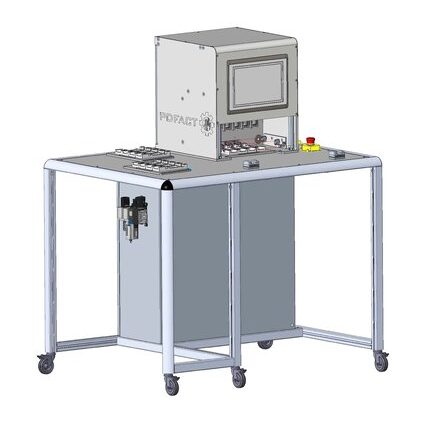Smaller and Smarter
Automation solutions are available to companies of all sizes in a wide range of industries—not just large-scale enterprises. In 2019, the Small Business Administration (SBA) found that 99.7% of firms in the U.S. had fewer than 500 employees.
According to the Bureau of Labor Statistics (BLS), 73.5% of manufacturing companies have fewer than 20 employees.
In order to compete, grow, and scale, small and medium-sized manufacturing enterprises are leveraging small automation projects and building infrastructure for custom automation solutions.
As the Industrial Internet of Things (IIOT) proliferates, small automation will become even more widespread.
The IIOT is defined as:
“The integration of sensors, controls, and software platforms to optimize performance at the production unit, plant, and supply chain levels.”
The IIOT provides enhanced communication between devices and people and greater access to advanced analytics.
Increased access to data leads to more efficiencies, including early problem detection, quality improvement, and cost-saving predictive maintenance.
Small automation projects require high levels of precision and specification on a short schedule.
For SMEs operating in the manufacturing industry, strategic implementation of small-scale industrial automation is a competitive advantage that creates opportunities to innovate and lead.
Take a closer look at the five key benefits of small automation projects.
1. Improve Individual Tasks Or Processes
Small automation helps accelerate and scale up capabilities in small and medium-sized facilities. Automation makes repetitive tasks or processes more efficient and frees individual employees or teams to focus attention on more challenging areas of the business.
The Bureau of Labor Statistics (BLS) found that employment in production occupations is projected to decline 4%, with a loss of about 423,200 jobs between 2019 and 2029. At the same time, workers that remain in the sector are seeking more challenging employment opportunities.
Small automation increases the ability to reallocate resources and use employees more effectively. Each manufacturing operation and environment is unique.
In addition to reducing or eliminating repetitive and tedious tasks, small automation can be used to ensure consistency, improve quality, and increase safety in specific environments. All of these benefits can be implemented in a relatively short period of time.
Key Points:
- Eliminate tedious, repetitive tasks
- Streamline processes
- Free up people to focus on higher-value work
- Implement automation or optimize existing infrastructure
2. Agile Implementation
Plug and play automation solutions are small, relatively simple, and easy to move. They’re an ideal option for SMEs looking to embrace automation for growth and scaling, especially as the manufacturing industry evolves and responds to labor shortages.
Agile implementation is easier to incorporate and can better position manufacturers to respond to shifts in market demands. After years of significant investment in machinery, applying strategic flexible automation to specific areas within a facility can enhance operations while curtailing the risk of costly disruptions or replacements.
PDFact offers a range of small automation solutions that can easily integrate into your environment including semi-automated or manual assembly equipment, disassembly equipment, and standalone or benchtop vision systems.
Today, quick and easy implementation and installation are more widely available. Agile implementation makes it possible to get results relatively fast.
Key Points:
- Plug and play solutions are available
- Focus on specific problems with highly targeted tools
- Flexible options increase agility
- Quick/Easy installation (Mechanical mantling, electrical connections, loading software)
3. Quality, Productivity, And Consistency
Automated systems can be used to dispense materials with mechanical precision or handle products safely and consistently. Highly focused small automation will ensure superior quality and output, especially in specific problem areas.
PDFact’s Custom Automation SSI Syringe Press was designed to assemble 1mL syringes into Safety Syringe Housings. To ensure the device is loaded correctly, Keyence location sensors were implemented to indicate acceptable device location.
Basic sensors and simple task automation offer high ROI. A short-term small automation project can add long-term benefits like increased productivity, decreased expenses, and improved safety.
As technology accelerates, automation solutions are more approachable and easier to adopt.
Key Points:
- Ensure the best outcomes
- Refine to a high degree of specifications
- Basic sensing and simple task automation available
- Automations applied to add value
4. Lower Barrier To Entry
Targeted opportunities for small automation offer a strategic entry point for facilities and operators looking to increase productivity. SMEs often use automation as a strategic business decision to augment and adapt existing systems.
In the past, floor space, time constraints, and safety were common obstacles, but today, custom automation solutions are more readily available.
Technology disruption and labor shortages have changed the manufacturing industry. 75% of machinists are over the age of 45. At the same time, workers in the industry are looking for more challenging employment opportunities.
Small automation allows companies to adopt leaner models in response to changes in market conditions.
Key Points:
- Fewer barriers to entry
- Optimize infrastructure you already have
- Strategic simple task automation
- Add more value
5. Innovation, Automation, And The Future Of Work
Throughout the 2020s, automation solutions will continue to evolve and the movement toward smart manufacturing will accelerate. Small automation provides highly customizable solutions that yield a high return on investment.
It’s a common misconception that machines or robots will replace humans. The reality is that innovation and automation enable humans and machines to work together– optimizing for safety, productivity, and potential.
Key Points:
- Fill in labor gaps
- Compete in modern manufacturing
- Automation will continue to change industries
- IIoT will enable more control and increase complexity
PDFact can help you identify where to implement automation to get the most value and help determine the most effective implementation strategies.
Call PDFact today 215-239-7618 or contact us to discuss small automation options from PDFact.

